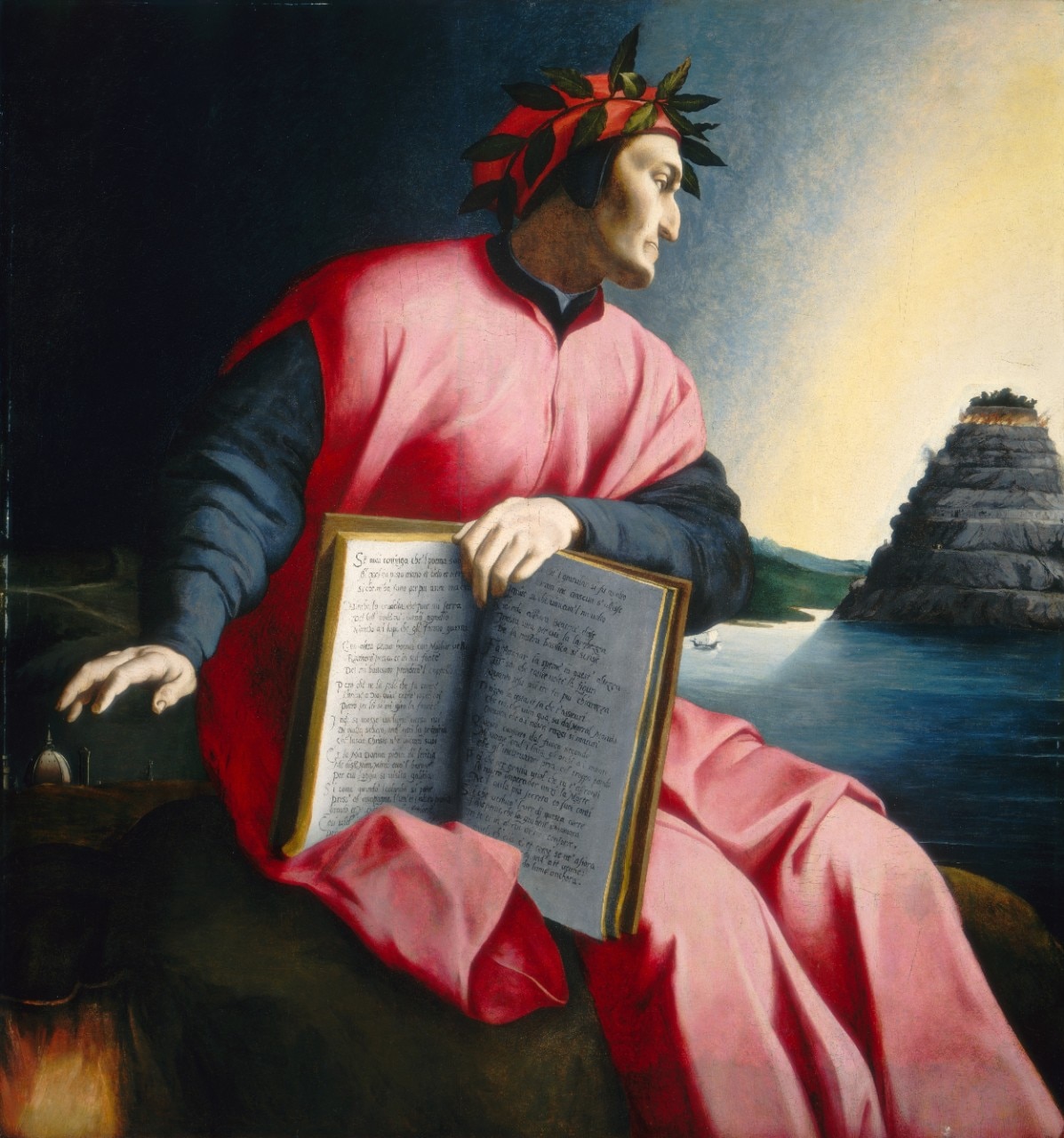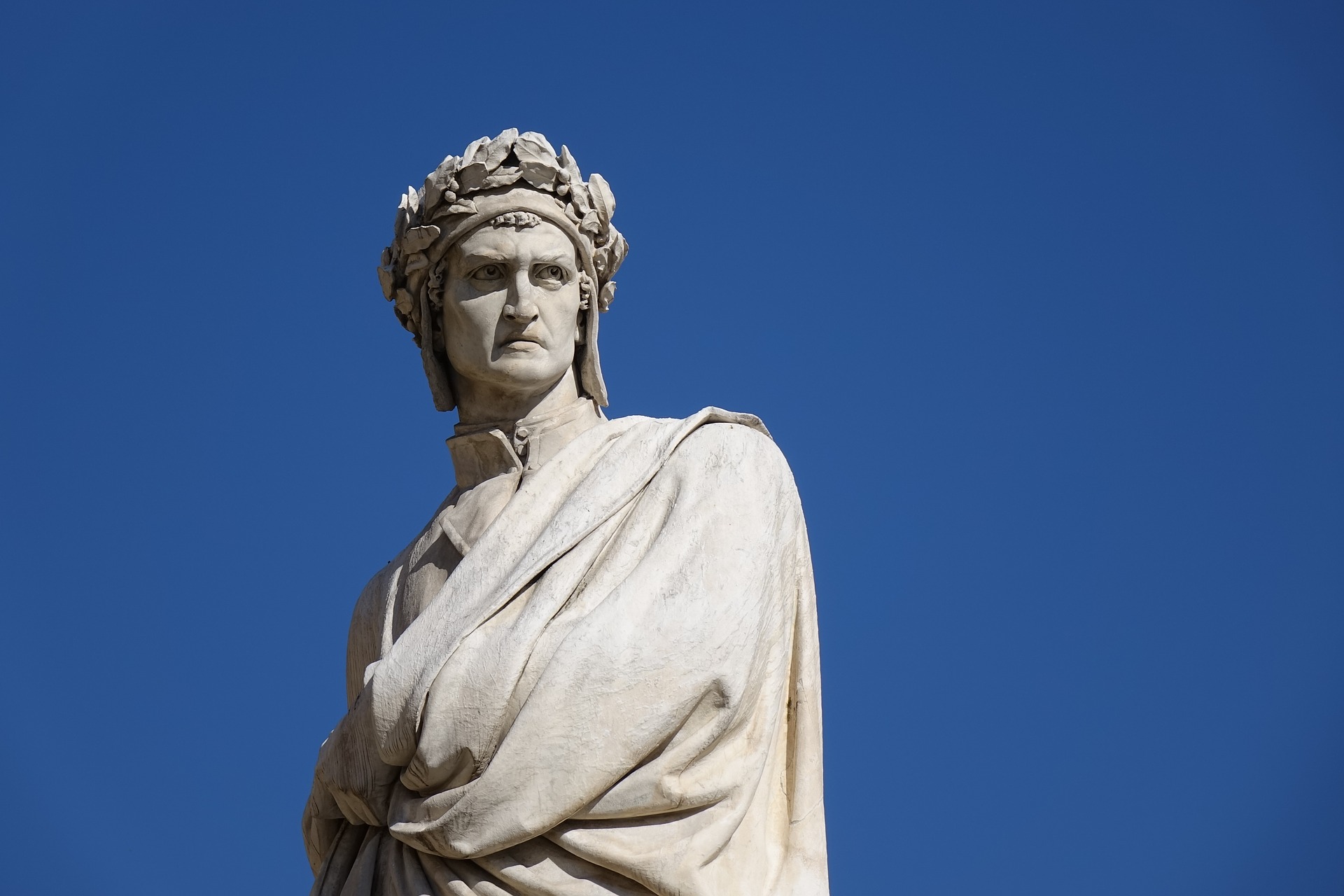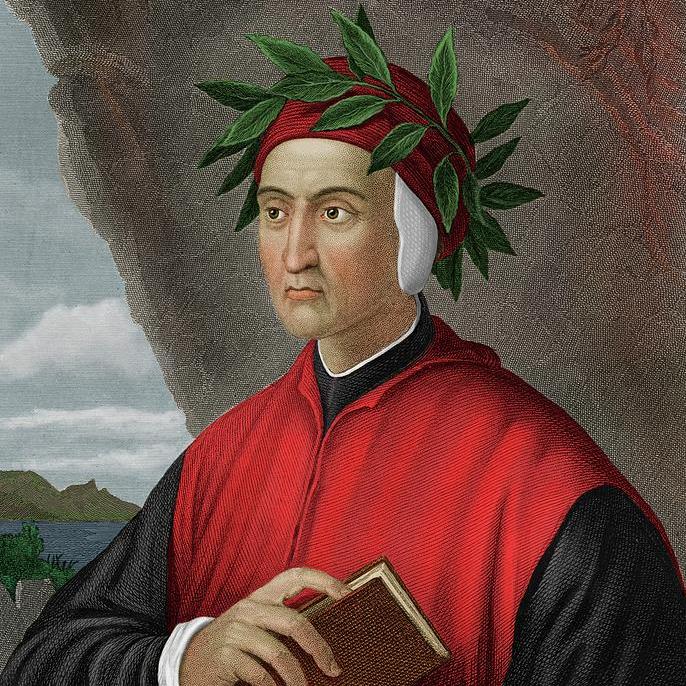Dante Alighieri Society Of Jersey City - Exploring A Literary Giant
For anyone who finds themselves drawn to the power of words, and, you know, the way stories can really change how we see the world, the idea of a place like the Dante Alighieri Society of Jersey City just feels right. This kind of group, it's almost a given, would certainly be a gathering spot for folks who appreciate the lasting impact of a writer whose work, quite frankly, took people on a wild trip through what comes after life. It's about connecting with a past voice that still speaks volumes today, offering ideas that keep on giving, even centuries later.
The main attraction, so to speak, for such a society would be the truly big work of this particular author, a piece of writing that has shaped so much of our thinking about, well, everything from bad choices to good outcomes. It’s a poem that, in some respects, paints pictures of places many of us can only imagine, places of fiery trials, cleansing moments, and, eventually, a kind of peaceful calm. This epic tale, as a matter of fact, really gets you thinking about what it means to be human, and what our actions here might lead to later on.
This piece aims to give you a bit of a look into the person behind these famous writings and the deep ideas within his most celebrated work, the one that many people know as the great trip through hell, purgatory, and heaven. We'll touch on the ways his story is put together, some of the characters you meet along the way, and why, honestly, his words still have so much meaning for us, even now. It’s a chance, in a way, to get a little closer to the mind that put these remarkable ideas on paper, and to see what might capture the interest of a group like the Dante Alighieri Society of Jersey City.
- Player 125
- Unveiling The Charismatic Actor From Mad Men A Journey Through Talent And Fame
- Haircuts For Straight Hair Men
- Imskirby The Dog Incident
- Many Summers Later Gravity Falls
Table of Contents
- Who Was Dante Alighieri- A Look at the Man Who Shaped Words
- What Makes The Divine Comedy So Special- Insights for the Dante Alighieri Society of Jersey City
- How Does Mythology Play a Role- Ancient Echoes in Dante's Inferno
- Why Does Dante Still Matter Today- His Enduring Voice for the Dante Alighieri Society of Jersey City
- A Glimpse into Purgatory- Hope Amidst Suffering in Dante's Work
- How Can We Understand Dante Better- Tools for the Dante Alighieri Society of Jersey City
Who Was Dante Alighieri- A Look at the Man Who Shaped Words
Dante Alighieri, a person whose name is often spoken with a certain respect, really made a mark on the world of writing. He was, you know, someone who dared to take readers on an incredible journey, a trip that, in a way, explored the very limits of human experience. His creative spirit, so it would seem, allowed him to craft a story that went to the very depths of despair and then, just as remarkably, rose to the highest points of pure joy. He truly had a knack for putting words together in a way that pulled you right into the story, making you feel like you were there with him every step of the way.
His writings, particularly the big one, are considered by many to be a true achievement, a work that stands tall in the history of written expression. It’s a piece that, quite literally, brought the ideas of hell, purgatory, and heaven into the common talk of people for generations. He was, in essence, a storyteller who wasn't afraid to tackle the biggest questions about life, death, and what might come after, and he did it with a kind of skill that is, honestly, pretty rare to find.
The impact of his work, you might say, is still felt today. It’s not just a book you read; it’s a piece of art that has influenced other writers, thinkers, and artists for hundreds of years. His ideas about consequences, about finding a path to something better, and about the nature of good and bad, they all continue to make people think. A group like the Dante Alighieri Society of Jersey City, naturally, would find endless things to talk about when considering the life and writings of this remarkable individual.
- Discovering The Multitalented Max Minghella An Artistic Journey
- Iran Live Cameras
- Lagos Cerca De Mi
- Aishah Sofey New Leaked
- Leaked Scarswonderland
Personal Details and Bio Data
| Name | Dante Alighieri |
| Known For | Author of "The Divine Comedy" |
| Birthplace | Florence, Italy |
| Main Work | The Divine Comedy (Inferno, Purgatorio, Paradiso) |
| Literary Style | Epic poem, allegorical, deeply symbolic |
| Key Themes | Morality, redemption, afterlife, medieval culture, philosophy, personal thought |
| Notable Characters | Virgil (guide in Inferno), Charon (ferryman) |
What Makes The Divine Comedy So Special- Insights for the Dante Alighieri Society of Jersey City
So, what exactly is it about "The Divine Comedy" that makes it stand out, even after all this time? Well, for one thing, it’s a really big poem, divided into three distinct sections, each one dealing with a different part of the journey through the afterlife. You have the first part, which is all about a place of punishment and suffering, then a middle section where souls are working to get better, and finally, a place of pure happiness. This structure, you know, gives the whole work a kind of flow that makes it easy to follow the progression of the main character’s experience.
Beyond just the story itself, this poem is built in a way that puts together different elements with a lot of thought. It brings in forms of writing, hints at other stories and ideas, and uses symbols to talk about big concepts like right and wrong, getting a second chance, and what happens after we leave this world. It’s a work that, quite honestly, keeps on giving, allowing readers to find new layers of meaning every time they come back to it. This depth is something that, naturally, would be a big topic of conversation for the Dante Alighieri Society of Jersey City.
The poem, in a way, even seems to know that it is a poem, which is a pretty interesting idea. It’s not just telling a story; it’s also, arguably, thinking about what it means to tell a story through poetry. This self-awareness, you might say, adds another layer of cleverness to the whole thing, making it more than just a simple narrative. It’s a piece of writing that, you know, plays with the very idea of how stories are made and how they affect us.
A Journey Through Realms- The Structure of Dante's Epic
The overall shape of "The Divine Comedy" is pretty clear, with its three main parts. The first part, "Inferno," takes the main character, Dante, through a place of great pain and sadness. Here, he is guided by the spirit of an old Roman poet named Virgil. This guide, you see, helps him make his way through the various circles of this difficult place, each one holding different kinds of suffering. It's a very vivid description, full of memorable scenes and characters, and it really sets the stage for the rest of the journey.
Then comes "Purgatorio," the second part, which shows a place where souls are working to cleanse themselves of their past mistakes. This section, it seems, offers a sense of hope, a chance for people to move towards something better. It’s a place of hardship, yes, but also of growth and change, where the end goal is a kind of peace. Finally, there is "Paradiso," the third part, which describes the highest points of pure joy and closeness to the divine. This last section, in a way, represents the ultimate reward for those who have gone through their trials and found their path.
This careful division, quite simply, helps to organize the vast scope of the poem. Each part has its own feel, its own set of rules, and its own kind of lessons to teach. It’s a journey that, you know, moves from the darkest corners of human experience to the brightest, showing a clear path of progression. This thoughtful arrangement is, arguably, one of the reasons the work has remained so popular and so deeply studied by groups like the Dante Alighieri Society of Jersey City.
Beyond the Story- Deeper Meanings for the Dante Alighieri Society of Jersey City
When you look a little closer at "The Divine Comedy," you start to see that it’s much more than just a story about a trip through the afterlife. It’s a work that, in a very intricate way, puts together different forms of expression, hidden meanings, and symbolic tales to really dig into big ideas. These ideas include, for example, the rules of right and wrong, the chance for people to make things right, and what happens to us after we are no longer here. It’s a piece of writing that, quite frankly, asks some of the biggest questions we can ask.
The way the poem uses hints at other stories and ideas, and how it layers on different levels of meaning, makes it a truly rich experience for readers. You might find, for instance, that a character or an event stands for something much larger than itself, representing a moral idea or a philosophical concept. This kind of depth is what allows the poem to be studied and talked about for so long, and it’s something that, honestly, would be a core focus for discussions within the Dante Alighieri Society of Jersey City.
It also brings together ideas from the time it was written, philosophical thoughts, and the author’s own personal reflections. This blend, you see, creates a truly expansive piece of writing, one that touches on many different aspects of human life and thought. It’s a masterpiece that, in some respects, gives us a window into the mind of a brilliant writer and the world he lived in, while still offering ideas that feel relevant to us today. This lasting quality is, naturally, a big part of why people continue to connect with Dante’s work.
How Does Mythology Play a Role- Ancient Echoes in Dante's Inferno
One interesting thing you notice in Dante's "Inferno" is how he brings in characters and ideas from old stories, specifically those from ancient Greek tales. It’s not just about Christian beliefs; he also pulls from the stories of gods and heroes that were around long before his time. This mixing of different traditions, you know, adds a unique flavor to his work, making it feel both familiar and, at the same time, a little unexpected. It shows, in a way, how different streams of thought can come together in one big creative effort.
For example, you meet a character named Charon in "Inferno," who operates a boat on a river called Acheron. These figures, you might say, come straight out of Greek mythology. They are not, basically, from Christian stories. This inclusion shows that Dante was, apparently, drawing from a wide range of sources to build his world. It’s a fascinating blend that, honestly, makes the poem even more complex and thought-provoking. This kind of detail would certainly spark a lot of interest for members of the Dante Alighieri Society of Jersey City.
The fact that he included these ancient elements, rather than sticking strictly to what was common in his own religious tradition, reflects a broader way of thinking. It suggests that he saw connections between different stories and different ways of understanding the world. This approach, in a way, makes his work feel more universal, reaching beyond just one set of beliefs. It’s a testament to his creative freedom and his willingness to explore ideas from many different places.
Figures from Fable- Charon and Acheron for the Dante Alighieri Society of Jersey City
The character of Charon, for instance, is a ferryman, a person whose job it is to take souls across a river. This river, Acheron, is also a name from ancient Greek tales, often thought of as a boundary to the underworld. When Dante places these figures in his version of hell, he is, you know, borrowing from a very old tradition of how people imagined the journey into the afterlife. It’s a direct link back to stories that were told thousands of years before his time.
The use of Charon and Acheron is, basically, a clear sign that Dante was not limiting himself to just one source of inspiration. He was, it seems, comfortable taking elements from various cultural backgrounds and weaving them into his own grand story. This kind of artistic choice makes the poem richer, adding layers of meaning that can be explored from different angles. It’s a detail that, frankly, shows the wide scope of his knowledge and his willingness to mix and match ideas.
For a group like the Dante Alighieri Society of Jersey City, looking at these mythical figures would be a way to talk about the different influences on Dante’s writing. It opens up conversations about how ancient stories continue to shape our own, and how writers can take old ideas and give them new life. It’s a pretty cool way, honestly, to see how different cultures and beliefs can come together in a single piece of art, creating something truly unique and memorable.
Why Does Dante Still Matter Today- His Enduring Voice for the Dante Alighieri Society of Jersey City
So, after all this time, why do people still talk about Dante Alighieri and his famous poem? Well, part of it is that his work, in a way, speaks to things that are timeless about being human. He talks about making choices, facing consequences, and the hope of something better, ideas that, you know, people have always thought about. His words continue to echo because they touch on universal experiences, feelings, and questions that we all, more or less, grapple with at some point in our lives.
His writings are not just old stories; they are, arguably, a kind of mirror, showing us different parts of ourselves and our society. The ways he describes human failings and triumphs, the different kinds of people he meets on his journey, all of it still feels relevant. It’s a work that, frankly, encourages us to think about our own lives, our own decisions, and what kind of path we are on. This ability to connect with readers across centuries is, naturally, a big reason for his lasting importance.
Furthermore, the poem itself is a piece of art that keeps on giving. It’s a work that, you see, can be studied from so many different angles—as a story, as a piece of history, as a philosophical text, or as a religious one. This richness means that there’s always something new to discover, something new to discuss, which is why a group like the Dante Alighieri Society of Jersey City would find it to be an endless source of fascination. It’s a work that, quite simply, refuses to be forgotten.
The Poet's Many Faces- Author, Narrator, Protagonist
It's interesting to think about the different ways Dante appears in his own work. There’s Dante the person who wrote the poem, the actual author, you know, sitting down and putting words on paper. Then there’s Dante the voice telling the story, the narrator, who guides us through the events. And finally, there’s Dante the character in the story, the one actually going through the journey, the protagonist. These are, basically, different versions of the same name, but each one has its own part to play.
Even though there are clear differences between these roles, what ties them together is the idea of being a poet. The author is a poet, the narrator is a poet describing the events, and the character on the journey is also, in some respects, a poet, observing and reflecting on what he sees. This connection to poetry is, honestly, a central idea throughout the work. It suggests that the act of writing, the act of making art with words, is a very important part of the whole experience.
For a group like the Dante Alighieri Society of Jersey City, exploring these different "Dantes" would be a way to get a deeper sense of the poem’s cleverness. It allows for discussions about how authors present themselves in their work, and how the act of telling a story can be just as important as the story itself. It’s a subtle but very meaningful detail that, you know, adds another layer of thought to an already complex piece of writing.
A Glimpse into Purgatory- Hope Amidst Suffering in Dante's Work
After the intense experience of "Inferno," Dante's journey takes him to a place called Purgatory. This part of the poem, you see, offers a very different kind of suffering. Here, people are still going through difficulties, but there's a really important difference: they have hope. They are, apparently, working towards a
- Emily Compagno Children
- Eliza Leaks
- Fiona Gallagher Shameless
- 69069 Text Message
- Who Are Zoe Perrys Parents Unveiling The Family Background Of The Talented Actress

Portraits of Dante Alighieri in history of art

Dante Alighieri and the medieval delicacies

The Feast of Dante Alighieri – Zero Equals Two!